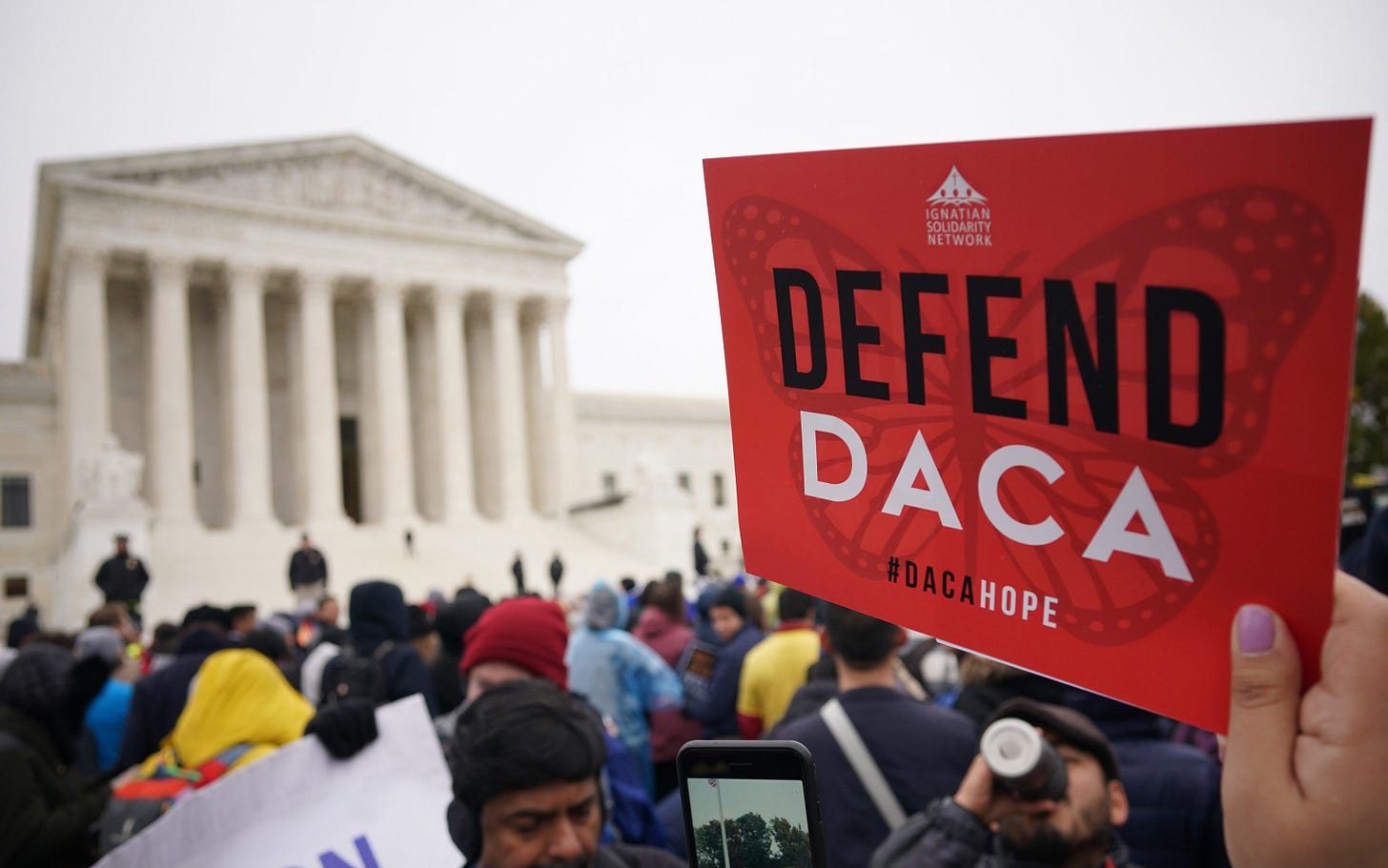Trump’s Ineptitude Saved DACA … for Now
The Supreme Court gave Dreamers more time, but it’s still up to Congress to find a permanent reform.

The Trump administration’s manifest incompetence just may have provided the silver lining for nearly 700,000 undocumented young people who came to the United States as children. In a 5-4 decision handed down Thursday, the Supreme Court narrowly rejected as “arbitrary and capricious” the administration’s efforts to end the program that protected DACA recipients. Under the Obama-era program, applicants could apply for “deferred action” on their removal and permits to work legally for a renewable two-year period so long as they were employed, in school, or serving in the military, paid their taxes, and had not been convicted of a felony or serious misdemeanor.
Thursday’s decision notably did not settle questions about the wisdom or legality of DACA but noted that the government had made no effort to consider options that would have preserved the interests of hundreds of thousands of young people who had relied on the protections the policy afforded, as required by the Administrative Procedures Act. Instead, the Department of Homeland Security attempted to wind down the program in September 2017 at the president’s insistence (Trump made a campaign promise to end it on his first day in office) without even considering “the conspicuous issues of whether to retain forbearance and what if anything to do about the hardship to DACA recipients” who had relied on it for a half decade.
The decision won’t guarantee long-term protections for DACA recipients, but it will allow breathing room until a new Congress and perhaps president take office in 2021. Americans overwhelmingly support DACA—some 85 percent in recent polls, including 73 percent of Republicans—but Congress has been unable to reach agreement on a permanent solution to the problem. Efforts to placate Trump with offers of $25 billion more for border enforcement were not enough to get a bill through Congress in 2018, and Democrats have been reluctant to separate DACA from larger issues of immigration reform. But a new administration and a Democrat-controlled Congress won’t automatically guarantee smart immigration reform. Much will depend on whether the anti-immigrant sentiment that infects much of the GOP base outlasts Trump’s influence.
DACA may be popular, even among Republicans, but it represents a tiny slice of the much larger issue of immigration reform. There are still nearly 11 million people living and working in the United States who lack legal status. Their fates also hang in the balance, and pursuing some equitable solution will likely be more difficult than many advocates imagine. President Reagan was able to grant amnesty to undocumented immigrants in 1986 because at the time there were no laws prohibiting such persons from working. Once the president issued his amnesty, undocumented immigrants were essentially home free and could even apply for U.S. citizenship after a waiting period. But Reagan’s decision to legalize some 3 million immigrants’ status entailed a compromise: He would support legislation, the Immigration Reform and Control Act, that made it illegal going forward for employers to hire immigrants who lacked work visas. IRCA supporters claimed the legislation would serve as a deterrent for future illegal immigration because would-be border crossers would face difficulty finding a job. Even Democrats supported the bill, largely because it punished employers, who Democrats believed exploited undocumented immigrants.
IRCA has been an abysmal failure; it resulted in no decrease in illegal immigration and it spawned new illegal behavior. Suddenly, Americans—citizens and immigrants alike—were required to prove their right to work under the law. Those without the proper documents bought phony Social Security cards or used Social Security numbers belonging to others, which encouraged a burgeoning industry in identity theft. Unless and until Congress changes IRCA or grants legal status to all currently undocumented people—including DACA recipients—those without permanent legal status or temporary work visas will still lead precarious and difficult lives.
Legal questions about the provenance of DACA and its rescission aside, the Supreme handed Congress yet another chance to enshrine a smart, broadly popular policy in law. They should do so before the administration gets its act together, promulgates a rule, and begins deportations.


